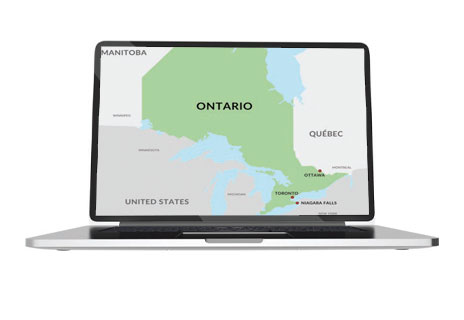Online in Ontario

When sports betting and online casino went live in a legal environment in Ontario April 4, 2022, it was a bit of an experiment. In the U.S., legal sports wagering and online gambling had been launching across the country since 2018. And in every state, those launches happened against a clean background.
But not in Ontario, where gray-market wagering and gambling had been happening for many years. The idea behind allowing single-event wagering and regulating both sports betting and online gambling wasn’t as much about bringing a new form of recreation to those in the province as it was about creating a safer environment for people to do what they’d already been doing.
During that first year, 2022-2023, iGaming Ontario (iGO) reported total online gambling handle of CA$35.5 billion (US$25.94 billion) and CA$1.26 billion (US$92 million) in total gaming revenue. Of total gaming revenue, CA$368 million (US$268.87 million) was from sports betting.
Those totals nearly doubled in the second year to CA$63 billion (US$46.03 billion) in handle and CA$2.4 billion (US$1.75 billion) in total online gaming revenue, iGO reported in April. Sports betting accounted for CA$9.7 billion (US$7.09 billion) in handle and CA$588 million (US$429.61 million) in revenue.
iGO reports that there are now 47 online gambling companies operating 77 platforms. Among those operators are familiar names like BetMGM, Caesars, DraftKings and FanDuel, and some unfamiliar—at least to Americans—including Bwin, Party Casino and Royal Panda. Some of those companies were operating in Ontario and other parts of Canada before legalization.
Blueprint for Other Provinces?
The initial rollout was a “slow burn” as players migrated from the gray market to the legal one, Brooke Hilton, PointsBet head of casino, said while on a panel at the SBC Summit North America in early May. She went on to say that after the first six months, interest picked up significantly.
Those in other parts of Canada have pointed to Ontario’s market as a blueprint for expansion. The Alcohol and Gaming Commission of Ontario has developed stringent rules around advertising that were further tightened with an update in February. But operators, Canada Gaming Association President Paul Burns said, have “deemed” the framework to “be fair.”
In developing those rules, Brent McCurdy, the AGCO’s chief legal officer, said his agency collaborated with and learned from many different sources before it went on to “shamelessly steal from the U.K. and parts of the U.S.”
While the AGCO will continue to tweak its rules, it’s also open to sharing its experience with other provinces. To date, Ontario is the only Canadian province with live, legal gambling. But Alberta and Quebec appear to be the next on the horizon.
Alberta, Quebec Considering Legalization
Like Ontario, Alberta has a gray market to contend with. Unlike Ontario, Alberta has bands of indigenous people that want a piece of the pie. In the U.S., states with a strong tribal presence have had to find more creative ways to include all partners in a legal sports betting launch. Alberta may face a similar challenge.
Burns projects that live, legal gambling could be available in Alberta sometime in 2025. Hilton said PointsBet is already “activating a player base” that she says is “mature” and has “high expectations.”
Bruce Caughill, managing director, Canada for Rush Street Interactive, said infrastructure is “in the works” in Alberta, but still has “a long way to go.”
Though the panel seemed to feel that legalization in Quebec is further down the road, officials in that province may be feeling some pressure to move sooner rather than later. Loto-Quebec, which would likely be the regulator, has been tasked with cutting $1 billion out of its budget, according to multiple media reports.
“What’s going on in Quebec is they just tabled a budget with an $11 billion deficit,” Caughill said. In the U.S., some of the states that were most strapped for cash during and after the Covid-19 pandemic shutdowns chose to move on legalization. Seven states legalized in 2020. Between 2018 and 2023, only 2019 was more prolific, when eight jurisdictions legalized.
Caughill said Quebec governmental officials may now feel “incentivized” to generate a new revenue stream.
According to a Mallet economic study, legal online sports betting brought in $145 million in revenue during its first full year, 2022-2023. Betway, Bet99, DraftKings, Entain (BetMGM), FanDuel, Games Global and Rush Street Interactive, all live in Ontario, are part of the industry coalition that backed the study. The coalition pushed the Ontario model as a successful one for other provinces to follow.
New Priorities
Two years in, the focus in Ontario has moved from tweaking platforms and creating name recognition in the province to other matters. Ontarians have been vocal about their distaste for all the gambling ads that interrupt Hockey Night in Canada, among other TV viewing experiences.
The most recent proof of that is a Maru Public Opinion poll, taken February 7-8, of 1,534 Canadians who are also Maru Public Opinion panelists. Of those surveyed, 59 percent said they favor a total ban on wagering advertising. Most also believe that operators are not acting responsibly and that there should be more government regulation.
While polls are often designed and taken to get a certain result, and a significant percentage of those polled by Maru were in the over-55 category, the sentiment matches the hue and cry that has been echoing through Canada.
There is similar sentiment in some parts of the U.S. In 2023, for example, Senator Paul Tonko proposed a federal wagering advertising ban. To date, no U.S. state legislature has voted for a complete ban on wagering advertising on TV. There have, however, been some very strict regulations around it.
Regulator Views
Ontario’s regulator has revisited its advertising rules more than once. It strictly limits who can shill for sports betting and gambling companies, and where operators can advertise. But even the latest revision to the ad guidelines, which ban using celebrities for advertising and promotions, don’t address the frequency of advertisements.
As time moves forward, the AGCO continues to massage its rules and address concerns. Of late, the regulator has elevated problem gambling and responsible gaming issues.
In the U.S., Maine and Massachusetts have tough advertising rules that all but ban sportsbook ads at sports venues. They also keep sportsbooks from partnering with local colleges and prohibit targeting anyone underage or in an at-risk group. The Massachusetts Gaming Commission at one point considered banning sports betting advertising during live-event broadcasts. However, it soon discovered that it wasn’t practical—in short, because companies like ESPN or Fox either weren’t likely to honor the ban, or would not be able to during national games.
Multiple major operators used well-known celebrities in sportsbook advertising in Ontario prior to the February 28 rollout of the rules update. Geoff Zochodne of Covers said those advertisements “served a purpose” and were to “alert people to the presence” of new operators. BetMGM featured two of the country’s most recognizable sports faces—Wayne Gretzky and Connor McDavid—as ambassadors.
McDavid’s Pivot
Now, neither can be used to pitch for the sportsbook. McDavid has pivoted to be the face of BetMGM’s responsible gaming television campaigns.
While a McDavid representative told CBC that responsible gaming is a “priority” for the Edmonton Oilers center, others say the change is a bit ironic.
“I go back to something that (Sharp Edge Picks founder) Harley Redlick told me a while back about celebrities representing sportsbooks. His take was that anyone who is gambling even just a little isn’t going to be attracted to a sportsbook just by Connor McDavid,” David Briggs of PlayCanada said on a Gaming News Canada podcast. “That’s clearly an attempt by sportsbooks to groom kids to one day pick their sportsbook brand based on who they might have had a poster of up on the wall of their bedroom.
“I was a little surprised that BetMGM spent the money to have him be a responsible gaming representative, but kudos to them. There probably is a positive, like Geoff said, that at the end there is probably more RG messaging. But that’s within the rules.”
Others in Canada say the swap from straight-up pitchman to responsible gambling spokesman is an uncomfortable look.
“You associate Connor McDavid with their site,” Andrew Kim, assistant professor in the psychology department at the University of Calgary, told CBC.
The new McDavid ads have been airing on television and on social media since the beginning of March. These include live fixtures during sporting events.
Beyond the new advertising guidelines, in late March the OLG announced that it increased its contribution to the Community Investment Programme that supports problem and responsible gaming initiatives, according to CDC Gaming Reports. It is seeking to create a centralized self-exclusion “solution” that will not only help players to easily self-exclude, but make it so that the regulator and every operator have access to the same information across Ontario. The submission deadline was May 8.
The Community Investment Program has received a two-year total of CA$760,000 (US$559,000). In FY2022-23, CA$22 million (US$16 million) was sent to problem and responsible gambling programs around the province.
“Ontario-made for Ontarians”
In the two years since launch, Ontario regulators have continued to evolve and respond to calls for consumer protection. The province is slightly bigger by population than Illinois or Pennsylvania, but has three or four times the number of sports betting or online casino operators. (Online casino is legal in Pennsylvania, but not Illinois). No U.S. state has so many operators.
Ontario is the biggest province in Canada, and its 14 million people include those in the country’s biggest city, Toronto. That city is home to seven professional sports teams, including three CFL teams, and the province borders Michigan, Minnesota and New York.
“When talking about Ontario’s iGaming market, the numbers tell us a lot,” Heidi Reinhart, the iGO board chair, said via press release in April. “But what I’m most proud of are the countless ways that our government partners, operators, responsible gambling experts, players and employees have worked together to help us create a world-class market that is Ontario-made for Ontarians.”
The regulatory process will continue to evolve, as it has in many U.S. markets. As the first Canadian province to legalize, Ontario will be the leader in Canada.
“Ontario has raised all boats,” Rush Street’s Caughill said. “It’s been welcomed and supported.”

